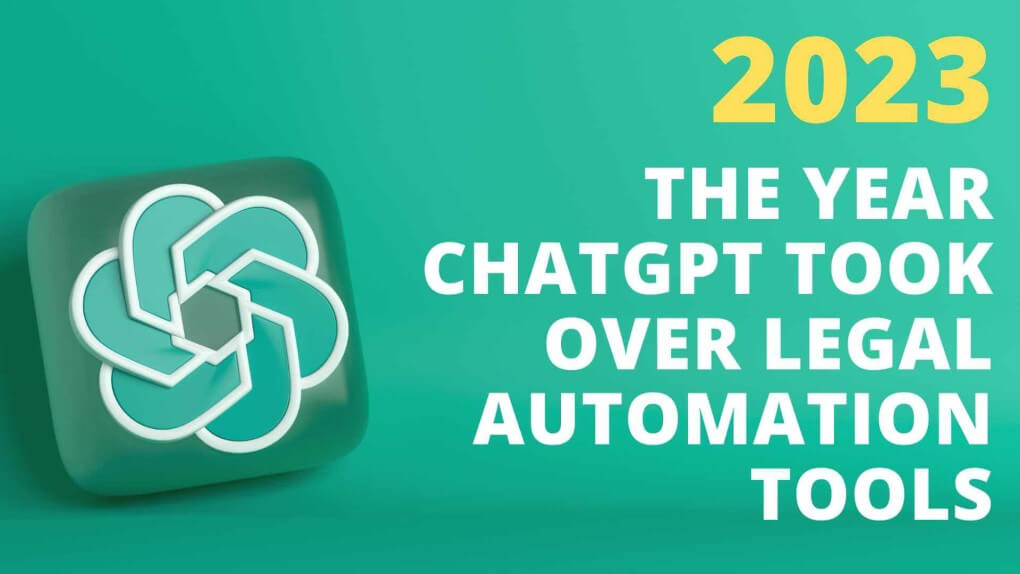In 2023, the legal industry witnessed a significant revolution in automation tools with the introduction of ChatGPT (Generative Pre-trained Transformer) technology. ChatGPT, powered by artificial intelligence, has proven to be a versatile and powerful tool for legal professionals.
Let’s admit that nobody likes doing routine and non-billable legal tasks, primarily when most lawyers and attorneys work beyond their regular work hours. However, due to their busy workloads, it can be challenging for legal professionals to learn about new technology and how to use it to automate their practice and processes.
What is ChatGPT
ChatGPT or to be more specific, GPT4 is an abbreviation for Generative Pre-trained Transformer (model three). It is a natural language processing (NLP) tool that works like a chatbot and uses AI to generate text from prompts. It is a powerful and versatile tool that can be used for various applications including legal automation.
As things go, it is safe to assume that ChatGPT will be an invaluable tool for the legal industry, helping lawyers and legal professionals work more efficiently and accurately.
How ChatGPT Can Help in Legal Automation
ChatGPT is versatile enough to automate many legal tasks, including
- Drafting legal documents and contracts compliant with applicable regulations.
- Contract review and abstractions, wherein it can identify major clauses per user input. ChatGPT can also identify various risks and potential areas of non-compliance.
- Legal research tasks, including identifying and retrieving relevant precedents on a specific point of law. It can quickly access relevant legal databases, helping lawyers stay up to date with the most recent rulings and changes in the law.
- Creating the first draft for various filings in litigation; for instance, ChatGPT can create the first draft of any document based on the client's or lawyer's input. It can also generate arguments to support a legal case.
- Predictive analysis of other factors, helping lawyers and legal professionals anticipate risks and develop alternative strategies accordingly.
Even though technology and AI have completely revolutionized how businesses operate in this increasingly tech-driven world, the legal profession has somewhat remained an outlier. If I had to guess, the reason behind such a laggard approach to adopting tech is quite evident. Most lawyers I know would prefer to give up their bar license instead of deep diving into tech automation tools.
Luckily, we are thrilled to list some simple automation tools that can help lawyers and law firms save time, increase efficiency, and attract new clients.
Scheduling and Appointments
Automating scheduling for lawyers can be a great way to start their automation journey and help take the hassle out of managing court dates and client appointments. ChatGPT can be used to automate the scheduling of appointments for lawyers. Lawyers can provide a chatbot to their clients that can quickly identify available times and dates for clients to meet with their lawyers without requiring either party to disclose their whole calendar to the other.
In addition, there are many free tools in the market, like Calendly, that eliminate multiple back-and-forth emails by automating the scheduling of client appointments. Later, the scheduling link can be included in your website, email signature, or client engagement letter.
Team Management and Collaboration
Team management can be essential for attorneys to ensure their practice runs smoothly and efficiently. ChatGPT can also automate the process of communication between team members, allowing for more efficient dialogue. It can generate automated emails, text messages, and calendar notifications, ensuring that lawyers stay updated and informed on projects.
Also, project management tools like Asana and Trello allow attorneys to assign and track tasks, set deadlines and communicate quickly with team members. Such project management tools also allow attorneys to automatically assign certain types of tasks to particular team members and automatically provide feedback on their progress based on pre-defined rules, enabling lawyers to run at least part of their practice on autopilot.
Additionally, such tools offer analytics to help attorneys review their team’s performance. Examining the data provided by such can assist legal professionals in recognizing issues and making modifications to optimize their practices and operations. Additionally, keeping tabs on data can enable attorneys to create more effective legal strategies for the future.
Risk and Compliance Management
Cloud computing, once a source of concern for lawyers due to data security and client privacy issues, has now become a valuable asset. Lawyers can access documents and data from any device at any time, offering unparalleled convenience. This technology not only fulfills their dreams but also helps reduce the costs associated with data storage and management.Cloud computing, once a source of concern for lawyers due to data security and client privacy issues, has now become a valuable asset. Lawyers can access documents and data from any device at any time, offering unparalleled convenience. This technology not only fulfills their dreams but also helps reduce the costs associated with data storage and management.
Furthermore, advancements in cloud computing and AI have enabled lawyers to automate the process of identifying risks and ensuring compliance with regulations. This automation empowers clients to minimize risks and remain compliant with the applicable legal framework. Cloud-based solutions can also automate administrative tasks such as organizing data related to legal cases and client information, tracking time, and sending reminders. These tools save significant time and effort, allowing lawyers to focus on more critical aspects of their work.
Client Communication and Obligation Management
Technology also plays a vital role in improving communication between lawyers and their clients. Automated communication tools, like ChatGPT, can generate emails, text messages, and calendar notifications to keep clients informed about the progress of their cases. Clients appreciate being updated in real-time, and this technology ensures they receive timely information.
Another challenge that lawyers face is contract management, particularly contract renewal. This process can be time-consuming and tedious, especially for larger businesses. By automating contract management, lawyers can save valuable time. For instance, DocuSign offers a free trial of its e-signature software for Word documents. This add-in allows for the automatic upload of documents into DocuSign, eliminating the need for multiple emails and manual tracking of changes.
Document Automation and Collaboration
Cloud-based Artificial Intelligence (AI) solutions have transformed the way legal documents are drafted, reviewed, and organized. Several tools exist in the market to automate these processes effectively. Here are some notable examples:
Voice Dictation:
Voice-to-text tools, such as Google's Voice Typing, offer lawyers an efficient way to capture their thoughts. While some prefer traditional typing, many find voice dictation to be an invaluable addition to their arsenal. ChatGPT also supports speech prompts, making it a versatile tool.
Document Collaboration:
Collaboration software allows multiple individuals to work together on a single document in real-time. It provides features like real-time editing, commenting, and presence indicators. Popular solutions in this category include Google Docs, Microsoft OneDrive, Dropbox Paper, and Confluence.
Contract/Document Management Systems:
Document Management Systems (DMS) and Contract Management Systems (CMS) centralize the creation, storage, retrieval, and management of legal documents. These tools automate workflows, enhance efficiency, and reduce the reliance on physical paper. SmartDocs, HotDocs, LegalSifter, and Kira Systems are examples of tools that simplify the process of creating, reviewing, and classifying contracts.
Billing and Knowledge Management
Technology, particularly ChatGPT, can automate billing and knowledge management for lawyers. ChatGPT can generate detailed client invoices with minimal input from lawyers, making financial tracking and timely payments effortless. This automation saves lawyers time and ensures accurate billing.
Conclusion
Today, lawyers can leverage technology to automate mundane tasks, streamline processes, and increase the efficiency of their practice. By leveraging technology, lawyers can free up time to focus on the critical aspects of their work, such as researching legal documents, preparing arguments, and representing clients in court. Furthermore, technology can help lawyers better understand the needs of their clients and provide them with the best possible legal advice.
We all know this and kind of agree with it as well, but so far the benefits didn’t significantly outweigh the pain in adopting such tools. However, with the introduction of ChatGPT, we are standing at a cusp of a significant disruption in legal automation tools. It has the potential to make these tools “just work like magic”. My money is that ChatGPT will do the same to the automation tool as iPhone did to smartphones in 2007.



